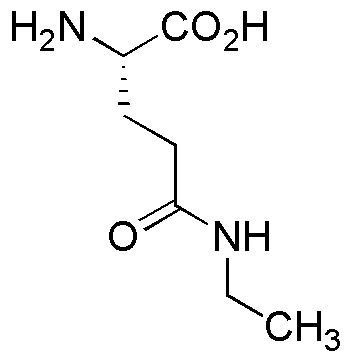Ng-Ethyl-L-glutamine is widely utilized in research focused on:
- Cell Culture: This compound serves as a vital nutrient in cell culture media, promoting cell growth and viability, particularly in the production of monoclonal antibodies and recombinant proteins.
- Neuroscience Research: It is used in studies related to neurotransmitter synthesis, helping researchers understand the role of amino acids in brain function and potential treatments for neurological disorders.
- Pharmaceutical Development: Ng-Ethyl-L-glutamine is explored for its potential in drug formulations, enhancing the stability and bioavailability of certain medications.
- Metabolic Studies: This compound aids in metabolic research, allowing scientists to investigate its effects on metabolic pathways and energy production in various biological systems.
- Food Industry: It is also being studied for its application in food products, where it can act as a flavor enhancer or nutritional supplement, improving the overall quality and health benefits of food items.
General Information
Properties
Safety and Regulations
Applications
Ng-Ethyl-L-glutamine is widely utilized in research focused on:
- Cell Culture: This compound serves as a vital nutrient in cell culture media, promoting cell growth and viability, particularly in the production of monoclonal antibodies and recombinant proteins.
- Neuroscience Research: It is used in studies related to neurotransmitter synthesis, helping researchers understand the role of amino acids in brain function and potential treatments for neurological disorders.
- Pharmaceutical Development: Ng-Ethyl-L-glutamine is explored for its potential in drug formulations, enhancing the stability and bioavailability of certain medications.
- Metabolic Studies: This compound aids in metabolic research, allowing scientists to investigate its effects on metabolic pathways and energy production in various biological systems.
- Food Industry: It is also being studied for its application in food products, where it can act as a flavor enhancer or nutritional supplement, improving the overall quality and health benefits of food items.
Documents
Safety Data Sheets (SDS)
The SDS provides comprehensive safety information on handling, storage, and disposal of the product.
Product Specification (PS)
The PS provides a comprehensive breakdown of the product’s properties, including chemical composition, physical state, purity, and storage requirements. It also details acceptable quality ranges and the product's intended applications.
Certificates of Analysis (COA)
Search for Certificates of Analysis (COA) by entering the products Lot Number. Lot and Batch Numbers can be found on a product’s label following the words ‘Lot’ or ‘Batch’.
Numéro de catalogue
Numéro de lot/série
Certificates Of Origin (COO)
This COO confirms the country where the product was manufactured, and also details the materials and components used in it and whether it is derived from natural, synthetic, or other specific sources. This certificate may be required for customs, trade, and regulatory compliance.
Numéro de catalogue
Numéro de lot/série
Safety Data Sheets (SDS)
The SDS provides comprehensive safety information on handling, storage, and disposal of the product.
DownloadProduct Specification (PS)
The PS provides a comprehensive breakdown of the product’s properties, including chemical composition, physical state, purity, and storage requirements. It also details acceptable quality ranges and the product's intended applications.
DownloadCertificates of Analysis (COA)
Search for Certificates of Analysis (COA) by entering the products Lot Number. Lot and Batch Numbers can be found on a product’s label following the words ‘Lot’ or ‘Batch’.
Numéro de catalogue
Numéro de lot/série
Certificates Of Origin (COO)
This COO confirms the country where the product was manufactured, and also details the materials and components used in it and whether it is derived from natural, synthetic, or other specific sources. This certificate may be required for customs, trade, and regulatory compliance.


